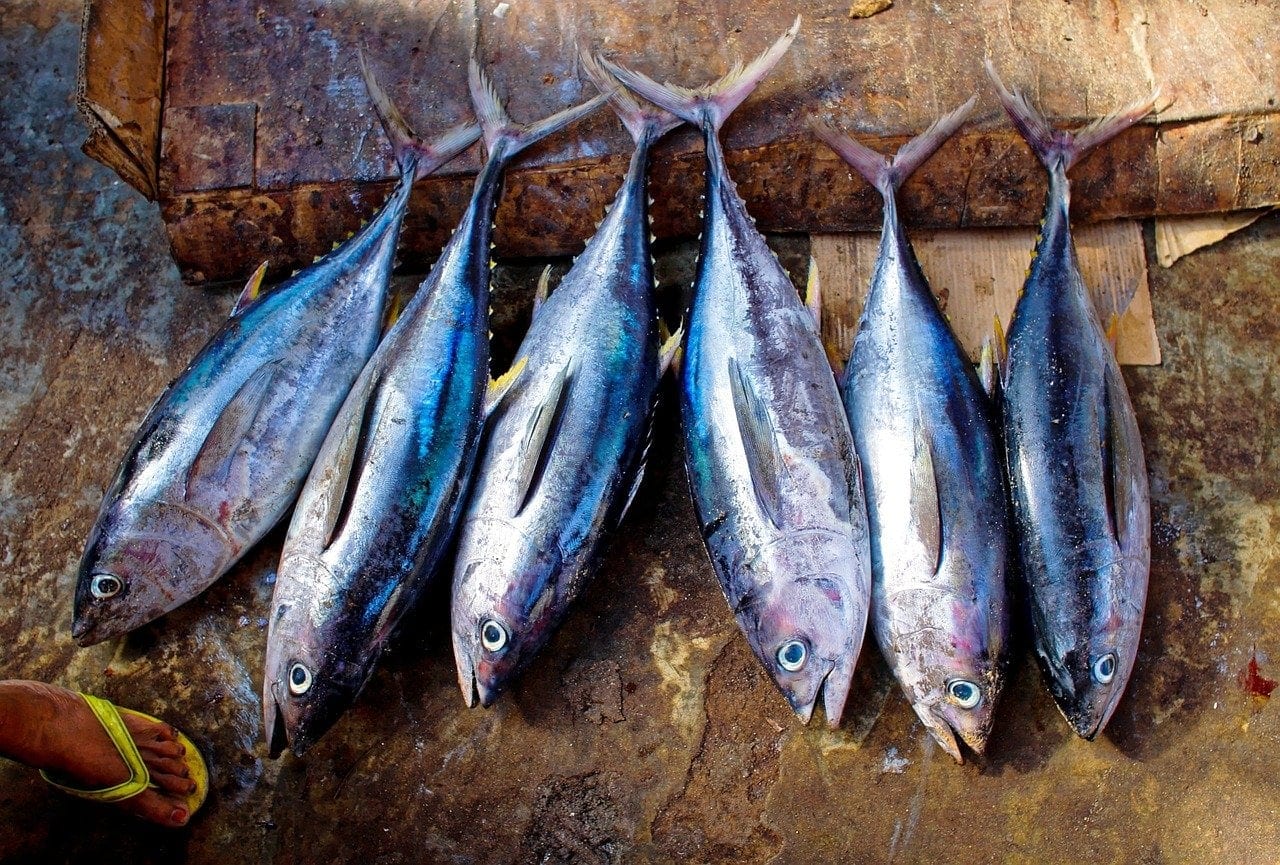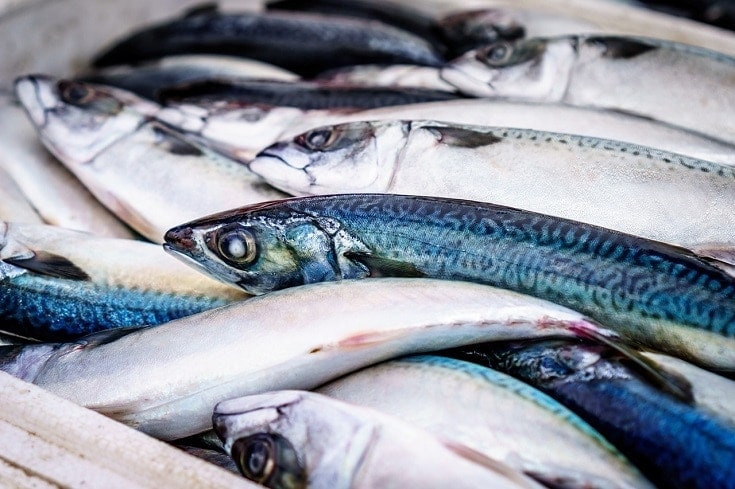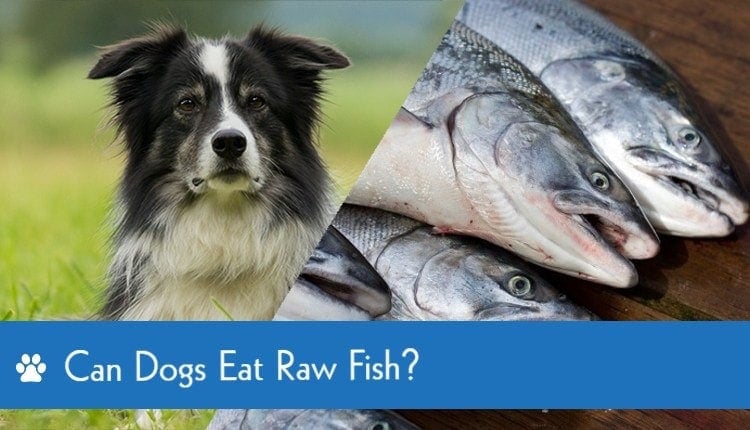Fish is a common ingredient found in cat and dog food, but have you ever wondered if it is okay to give your dog a bite of raw salmon or tuna?
Is raw fish safe for your dog to eat? The short answer is no. Fish is a healthy food for your dog, but it’s safest to cook the fish first before giving it to your dog.
Fish as a Healthy Source of Food
There are all kinds of nutritious goodness found in fish. Particularly fatty fish, which are full of nutrients such as protein, iodine, Vitamin D, and omega-3 fatty acids. Fatty fish include mackerel, tuna, salmon, trout, and sardines.
Some of the health benefits of fish can include:
- Contains nutrients necessary for development and growth
- Makes for a healthy brain
- Contributes to treating and preventing depression
- May prevent heart attacks and stroke
- Might help children from developing asthma
- Can reduce autoimmune diseases
- Might improve the quality of your sleep
- Can help prevent vision loss in seniors
The American Heart Association does recommend eating fatty fish two times a week as a part of a healthy diet for humans.

Fish and Your Dog
Fish is quite easy to prepare and clearly has a number of health benefits for us humans, but what about dogs?
- Extra source of protein.
- Fish can minimize and control food allergies.
- Fish skin is a source of collagen, which can contribute to the skin and bone health of senior dogs.
- The omega-3 fatty acids in fish can contribute to healthy skin and coat.
- The same omega-3 fatty acids also act as an anti-inflammatory. This will help dogs with such problems as arthritis or that have an inflammatory bowel disease.
- Canned light tuna
- Cod
- Salmon
- Whiting
- Herring
- Whitefish
- Flounder
- Catfish
These fish are safer for your dog because they are not as likely to have serious parasite issues, and they’ll have lower mercury levels.
Fish is clearly a highly beneficial ingredient that can be a healthy food source for your dog. However, if you decide to include fish in your dog’s diet, you also need to be aware of the negatives.
The Downside for Dogs
While fish can be healthy for your dog, there are some issues that should be taken into consideration.
The kinds of fish that are not safe for your dog to eat include:
- Tilefish
- Swordfish
- Shark
- King mackerel
- Canned albacore tuna
These types of fish are usually collected when they are bigger and older and tend to have much higher levels of mercury and parasites found on their skin and internally. Any fish that has been farm-raised should also be avoided.

Raw Fish
The American Veterinary Medical Association does recommend cooking all animal-based proteins before feeding them to your pet. Like humans, raw or undercooked fish can harbor many parasites and pathogens that can cause illness or death if ingested.
Salmonella, Clostridium, and Listeria are all dangerous bacteria present in undercooked fish that can also pose a danger to humans when transmitted from your dog. If you choose to cook fish for your dog, you need to be sure to follow all the necessary precautions. Disinfect cooking surfaces as well as utensils and bowls after use, and wash hands thoroughly.
However, raw fish that is safe for humans is usually safe for dogs, such as sushi. But it’s probably better to err on the side of caution and only provide your dog with properly prepared and cooked fish.
- Vomiting
- Diarrhea
- Fever
- Weight loss
- Swollen belly
If you suspect your dog may have parasites, take your dog to the vet immediately.
Oils and Seasonings
You should also avoid frying the fish in oil and seasonings. Too much oil can cause gastrointestinal upset, including vomiting and diarrhea, or even develop into serious health problems such as pancreatitis. Certain seasonings can also contain harmful ingredients for your dog, such as onions and garlic, which should be avoided.
Fish Bones and Skin
One of the biggest problems with feeding fish to your dog is the bones. Fish bones are tiny and can be very dangerous to your dog if ingested. They can become stuck in your dog’s mouth, throat, stomach, and intestines and can even penetrate through the walls of the intestines and stomach. All of this can cause extreme pain in your dog and requires rather expensive visits to your vet. If you see your dog drooling excessively and pawing at his mouth after eating fish, he may have a bone stuck in his mouth or throat and should be seen by your vet as soon as possible. Fish heads, tails, fins, and bones should not be fed to your dog, and any fish that you plan to feed to your dog should be cleaned, deboned, and filleted beforehand.
Fish skin is only safe for your dog to eat if it has been dried and the scales have been removed and has had no oils or seasonings added.

Conclusion
The safest way to prepare fish for your dog to eat includes ensuring all bones are removed and grilling, baking, or steaming the fish without any oil or seasonings. It’s safe to feed this kind of fish to any dog, including puppies and pregnant females but be sure you’ve consulted with your vet first.
If you’ve decided to add fish to your dog’s diet, speak to your vet as they can help guide you to the best kind of fish and the proper technique for preparing it for your dog. You can use fish as an occasional treat, or if your dog’s health will benefit from adding it to his diet, your vet will help you to figure out how much fish your dog should eat based on his weight, age, and medical condition.
As long as you’re careful, fish is a healthy and beneficial protein that your dog may enjoy on a regular basis.
Featured Image: mschoettchen, Pixabay







